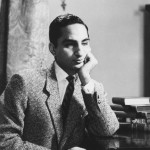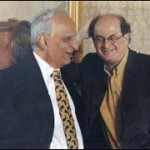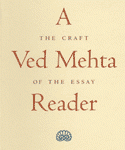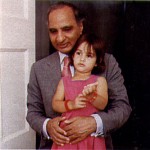Ved Mehta: His Prose Is ‘Airy, Elegant, Clear’
“Money may not be everything to the writer of serious works rarely destined for top-10’s and movie deals, but it certainly helps, as Ved Mehta was saying this week about his five-year award totaling $236,000 from the John D. and Catherine T. MacArthur Foundation.
Mr. Mehta, a New Yorker magazine staff writer, has written more than a dozen books about his native India, his blindness from the age of 3, his fascination with Western philosophers and theologians and his extremely acute perceptions of places and people. He was one of 19 persons announced yesterday as recipients of the foundation’s no-strings fellowships.
“It makes me feel freer of financial pressure,” said the 48-year-old author as he sat in his book-lined office furnished in the non-décor style of The New Yorker’s headquarters on West 43d Street. “I am still numbed by it. One has no tenure as a writer. You’re as good as what you last wrote.”
Works 7 Days a Week
“I’ve been sitting in this little office from 10 A.M. until a quarter to 8 five days a week for 20 years, and I work at home on the other days,” he said. “I’ve been embarked on a project, a personal history. The third volume, Vedi—that’s my first name, familiarly—will be published by Oxford Press in September, and I’m already well into the fourth. The advance on Vedi was $2,000, and it took me three years to write the book.”
Mr. Mehta, who came to America at the age of 15 and has lived here ever since, except for several years during postgraduate work at Oxford, was not crying poverty but rather spelling out, as a careful writer does, what the award will mean to him. Indeed, he emphasized that in some years he had made more than $70,000 but in others maybe less than $10,000. The New Yorker, he said, is one of the highest-paying magazines, if not the highest, for articles.
Money, however, demonstrably is not in the forefront of this inquiring and imaginative writer’s mind. He is a very private person; he once spurned an invitation to immediate pop fame by not appearing, when asked, on “The $64,000 Question” television quiz show. He is more interested in ideas and books and spreading the word on both.
Weaver of Profiles
As a writer, Mr. Mehta has gained critical note as a weaver of profiles, as an interviewer who can interpret character and context in the exchange of words with a subject. He is scholarly and journalistic and, above all, a man who thinks things out. He is blind, yet in his writings he describes with scrupulous detail appearances of rooms, countryside, faces, attire. He has in the past said that this talent is inexplicable, that he did not understand all the mechanisms involved and dismissed the theories formulated by others to explain it.
Yesterday, William Shawn, editor of The New Yorker, who invited Mr. Mehta to join the staff in 1961, spoke of the qualities he discerned in him as an author.
“Ved Mehta has established himself as one of the magazine’s most imposing figures,” he said. “His literary qualities are his own. Where there were no forms to accommodate what he wanted to say, he created new forms, and his prose style—airy, elegant, marvelously clear—is his signature. He writes about serious matters without solemnity, about scholarly matters without pedantry, about abstruse matters without obscurity.”
Mr. Mehta more often than not has appeared in print with writings about his homeland, home and himself, with an emotional bond and a simultaneous intellectual objectivity. At age 23, an autobiographical study, Face to Face, was published, and he went on to write novels and nonfiction. These themes have become central to him as a writer, and this is where the fellowship will lend a beneficent hand.
A Lifetime Project
“I want to continue this series,” he said. “I have 10 more volumes in my head. If I work the rest of my life, I won’t finish it. This project is not very commercially profitable. People have a great resistance to things set in other cultures. With a serious book it becomes harder and harder. Who wants to read a book about somebody’s mother that ends in 1932, as Mamaji, the second book in this series, after Daddyji, does?”
Mr. Mehta, a trim and energetic man, observed that books by him and his colleagues have to be published, if at all, more and more by university presses, a condition that has intensified and did not apply in the 1960’s and early 70s. He has received a $500 advance from Columbia Press for a reissue next year of Fly and the Fly-Bottle: Encounters With British Intellectuals, first published in 1963. By September, he said, he will have had 14 books published, 10 of them by Penguin.
“In my case, being blind, it is not just a case of getting a pencil. Everything I write must be read aloud, must be read back to me. I did nothing for five years but write Mahatma Gandhi and His Apostles, published in 1977. I read 400 biographies of Gandhi. For this I received what, to me, seemed a huge advance, $15,000 from the Viking Press. I hope the book will live, but Gandhi is not a commercial subject. The way people read today, they want fast material, a précis, not something that can be read aloud.”
Mr. Mehta said that he could not have written at all without The New Yorker. Beginning in 1961, he received a monthly check of $800 as an advance against his writings for the magazine, a sum increased to $1,400 several years ago.
“Basically, it’s the confidence of the editor,” he said. “My writing here has been eccentric, it bounces on the wall. I did a three-part profile of Gandhi for The New Yorker, although they had up to then never done anything like that on people who were dead.”
Mr. Mehta was born in Lahore in 1934 into a Hindu family that fled in 1947, when the region was incorporated into Moslem Pakistan. When he was 3 years old he was blinded as a result of cerebrospinal meningitis. There was a hopelessness attached to the lives of the blind, who were expected to become dependents or beggars, and the boy’s family sent him in 1949 to America, to the Arkansas School for the Blind, where he swiftly learned how to exploit his not inconsiderable talents and resources. He is an American citizen.
His elation at receiving the MacArthur fellowship is not unlike that of one who has won, against great odds, a lottery.
“It reminds me of when I was 18,” he said. “My father, a public-health official in India, was then a Fulbright scholar at the University of California at Los Angeles. There was no money for me to go to college. Lux soap had one of those contests: if you could write 25 words about how good Lux was, you could win a car and some money.
“Every morning he and I went out and bought a dozen cakes of soap, tore off the wrappers and wrote entries. We didn’t win, but this fellowship is like that, coming through. I really distrust people who have radical changes in life. If this changes me, it will do so gradually.”





